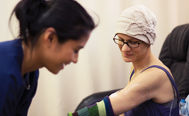Cancer Radiotherapy
Radiotherapy is a treatment doctors often recommend to patients. Similar to the way in which chemotherapy is used, cancer radiotherapy provides one of three treatment strategies. It can be used either as a standalone treatment or in combination with surgery or chemotherapy.
Cancer Radiotherapy Strategy
When developing a cancer radiotherapy strategy for a patient, several variables are considered. Doctors will evaluate a patient’s age and medical history and study tumor characteristics such as stage, type, location and invasiveness. Since radiotherapy is often combined with different types of treatment, two or more practitioners could be involved in a patient’s case.
When chemotherapy is part of treatment, a frequent member of a cancer care team is the Cancer Center of Southern California. In addition to its international reputation for advanced drug therapeutics, it is led by one of the most renowned oncologists Dr. Sant Chawla, a pioneer in chemotherapy innovation and investigative clinical trials. Many patients seek out Dr. Chawla for access to new drug therapies and clinical trial participation.
Cancer Radiotherapy Side Effects
A side effect that a person might not consider is the effect of radiation on the skin. Proper skin care can help alleviate this. Some recommended advice includes:
- Shower and bathe in lukewarm water – do not rub treatment area, but instead pat it dry.
- Do not use heating or cooling pads – nothing hot or cold should be placed on the skin.
- Dress in loose natural clothing – soft cotton clothes are best
- Apply aloe vera-based gel or cream – considered a protective ingredient skin. Apply to treatment area twice a day and two weeks after treatment
- Avoid the sun – protect skin with protective clothing; consult your doctor regarding sunscreen
Following these suggestions can help to minimize or possible eliminate adverse reactions to radiotherapy for your skin. It’s not uncommon for skin to turn red and tender and to begin to itch, peel, or blister, but the side effects are temporary. Your skin will heal gradually after treatment. It’s also normal for skin to slightly change its color.
You should discuss skin care with your doctor before you begin treatment and as part of your conversation, include a discussion about appropriate use of deodorants, lotions, or creams on the treated area.
Ask the Cancer Care Specialists
If you have question about your cancer treatment or would like to know whether your treatment plan is the most favorable for you, contact the Cancer Center of Southern California today at 310-552-9999 to schedule a consultation with Dr. Sant Chawla. He is an internationally recognized authority on cancer treatment and can help you with answers.
Next, learn about: cancer treatment.


